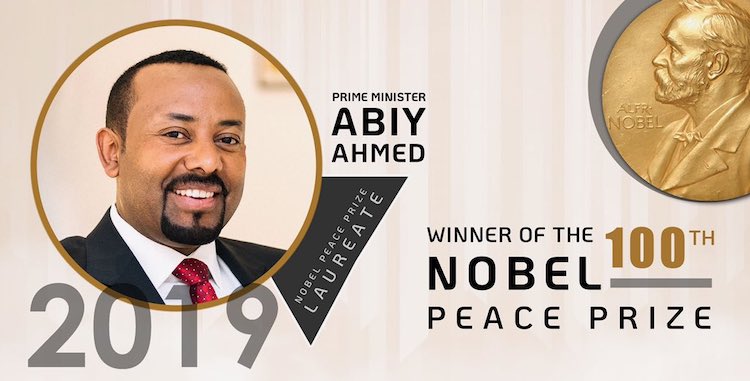Viewpoint by Makeda Saba
BRUSSELS (IDN) – On October 11, 2019, the Norwegian Nobel Committee awarded the 2019 Nobel Peace prize to the Prime Minister of Ethiopia Dr Abiy Ahmed. He is the fourth African leader to be bestowed that honour after President Anwar Sadat in 1978; President FW de Klerk in 1993); and President Ellen Johnson Sirleaf in 2011.
Other eminent Africans who have become Nobel peace laureates are: Bishop Despond Tutu in 1984 for his efforts in resolving and ending apartheid in South Africa; Nelson Mandela in 1993 for his work during the civil rights revolution in South Africa; Kofi Anan in 2001 for efforts towards a more peaceful world; (2004) Wangari Muta Maathai in 2004 for her contribution to sustainable development, democracy and peace; Mohamed El Baradei in 2005 for his efforts to prevent the use of nuclear energy for military purposes; and Leymah Gbowee in 2011 for her nonviolent struggle for the safety of women and women’s rights.
The Nobel peace prize has been awarded to Prime Minister Abiy in recognition of “…his efforts to achieve peace and international cooperation, and in particular for his decisive initiative to resolve the border conflict with neighbouring Eritrea”.
The Nobel Committee recognised his reform efforts in Ethiopia through such actions as the suspension of the state of emergency, the release of political prisoners, the modification and change of repressive legislation that was shutting down civil society space and was restricting freedom of speech. And, finally the reconciliation efforts with Ethiopian political opposition groups including the armed groups that had been hosted by Eritrea.
At the regional level, the Nobel Committee recognised the Prime Minister’s efforts in the reconciliation between Eritrea and Somalia and Djibouti, South Sudan peace process, Sudan peace process, as well as the mediation between Kenya and Somalia on the issue of the maritime border.
The Committee Chair Berit Reiss-Andersen, emphasised that the Committee is aware that Prime Minister Abiy is only at the start of his work both within Ethiopia as well as on the Eritrea peace process and that there is much more still to be done. However, it is the Nobel Committee’s hope and wish that the Prize will be an encouragement and an incentive for him to continue with the work that he has started.
Beyond the deserved, congratulations and the jubilations for the award there are concerns as to the timing of the award – specifically that it might be too soon. Morris Kiruga, editor of the African Report, asks: “It the Ethiopian Prime Minister Abiy Ahmed’s Nobel Peace Prize a poisoned chalice?”. This is a legitimate question as both the internal reform processes and the peace process with Eritrea are fragile.
Internally, irrespective of the reforms achieved so far, Laetia Bader of Human Rights Watch reminds us that: “…. there has been increasing ethnic conflict and ongoing breakdown of law and order across much of Ethiopia.” And that: “Abiy’s government should have done more to resolve these ethnic problems.” However: “…it has responded to resulting large scale displacements by coercing displaced persons to return to their homes areas when many still felt unsafe.”
A day after the announcement of the award of the Nobel Peace prize to Prime Minister Abiy, there was a stark reminder of the complexity of the situation he faces in Ethiopia, when the Ethiopian police banned a planned protest at Meskel Square in Addis Ababa. The demonstration was against Oromo politicians and nationalist who claim ownership over the capital city.
The other poisoned chalice is Eritrea. The peace process with Eritrea has stalled. Laetia Bader of Human Right Watch[1] reminds us that: “…. the trickier issues around the agreement remain unsettled: Eritrea’s borders remain closed, the border between the countries has not been demarcated, and the exodus of Eritreans fleeing the brutal restrictions imposed by their government continues.”
While Prime Minister Abiy has undertaken sweeping reforms within his country, including the reconciliation with the armed Ethiopian political opposition hosted by Eritrea, there has been no effort on his part to engage the Eritrean government on issues of reconciliation with Eritrean opposition groups and activists residing in Ethiopia; and internal reforms addressing human right issues raised by both the African Commission of Human and Peoples Rights as well as the UN Commission of Human Rights.
During this period the Ethiopian government has withdrawn its protection of Eritrean opposition members and activists with the result that many, fearing for their safety, have left Ethiopia.
The expectation is not that Prime Minister Abiy resolve the internal issue of Eritrea. The expectation is that, as a Regional Leader; a Reformer and Peace Builder he should continue to offer protection to all Eritreans in Ethiopia, including activists and opposition groups. And, he should not be silent as to the ongoing human right abuses in Eritrea.
The ongoing human right abuses in Eritrea are a regional concern as they impact regional peace and security and, they are issues that have been brought before the African Commission of Human and Peoples Rights whose communications continue to be ignored by the Eritrean government.
It is hoped that this Nobel Peace prize will encourage Prime Minister Abiy engage his Eritrean counterparts beyond political pragmatism and on issues of peace and reconciliation at all levels. [IDN-InDepthNews – 16 October 2019]
Photo credit: Office of the Prime Minister of Ethiopia
IDN is flagship agency of the International Press Syndicate.
facebook.com/IDN.GoingDeeper – twitter.com/InDepthNews

